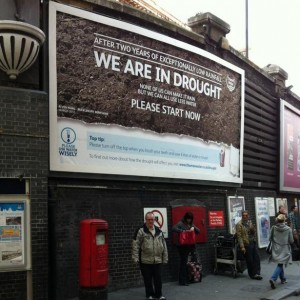Federal Water Tap, April 2: Great Lakes Water and Wind
Rise and Fall
The bilateral commission charged with coordinating U.S. and Canadian policies on the Great Lakes released a draft plan for regulating water levels in Lake Ontario. The proposal will keep the lake closer to natural flow patterns: water levels during high and average conditions will be kept higher, and kept lower under low flows.
A broader study looking at water regulation in the rest of the Great Lakes basin recommended against using manmade structures to control lake levels, according to the Associated Press.
Great Lakes Wind
The Obama administration and five Great Lakes states announced a plan to coordinate regulatory processes for offshore wind power projects in the nation’s largest bodies of surface water. On a conference call, Deputy Energy Secretary Daniel Poneman said that the agreement “makes sure we are efficient in processing projects that come forward.”
No projects are currently seeking approval, but a developer has shown interest in Lake Erie, near Cleveland.
Carbon Rules
The U.S. Environmental Protection Agency announced limits on carbon emissions from new power plants. The rule—which caps carbon dioxide output at 1,000 lbs per megawatt-hour—will apply to facilities that begin construction 12 months from now. Yet, with energy economics turned upside down by the natural gas boom, the EPA and the Department of Energy acknowledge that new plants, largely gas-powered, are expected to meet the new standard “even in the absence of the rule.”
The agency is still mulling emissions regulations for the nation’s existing fleet of power stations.
Water and Climate Change Strategy
Today, the EPA is releasing a draft strategy that analyzes how climate change will affect the agency’s programs to protect water and public health. This is an update to a strategy first released in 2008. The public can comment on the document until May 16 via email at owdocket@epa.gov. Include EPA-HQ-OW-2011-0943 in the subject line.
Fracking Review Extension
The EPA is extending the public comment period for its study on the effects of fracking on groundwater resources near a Wyoming town. The agency will accept comments through October 16. Send comments to ORD.docket@epa.gov, with EPA–HQ–ORD–2011–0895 in the subject line.
In Pennsylvania, meanwhile, the EPA released the results from the first round of groundwater testing in a town that has become the eastern epicenter of contention over the effects of fracking. Tests from the first 11 homes in Dimock revealed high methane levels that pose a risk of explosion, but the EPA claimed that the water “did not show levels of contamination that could present a health concern,” according to Bloomberg News.
EPA and the Courts
Greenwire reports that EPA lawyers, in a recent case argued before the U.S. Supreme Court, failed to include relevant information in the official record, meaning that it was not reviewed by the justices. The court ruled unanimously against the federal government, saying that property owners can have a judge review EPA orders regarding water pollution. Agency documents acquired by the Natural Resources Defense Council show that the plaintiffs knew that their land was classified a wetland.
The EPA is also being sued in federal court by several environmental organizations that would like a timetable for setting air pollution regulations for power plants in the Four Corners region, the Associated Press reports.
In Texas, the EPA decided to drop a groundwater-pollution lawsuit against an energy company drilling in the Barnett shale formation, Bloomberg News reports. The agency and Range Resources have agreed to test more wells in the area to find the pollution source, which the company claims is not connected to gas drilling.
Federal Water Tap is a weekly digest spotting trends in U.S. government water policy. To get more water news, follow Circle of Blue on Twitter and sign up for our newsletter.
Brett writes about agriculture, energy, infrastructure, and the politics and economics of water in the United States. He also writes the Federal Water Tap, Circle of Blue’s weekly digest of U.S. government water news. He is the winner of two Society of Environmental Journalists reporting awards, one of the top honors in American environmental journalism: first place for explanatory reporting for a series on septic system pollution in the United States(2016) and third place for beat reporting in a small market (2014). He received the Sierra Club’s Distinguished Service Award in 2018. Brett lives in Seattle, where he hikes the mountains and bakes pies. Contact Brett Walton





Leave a Reply
Want to join the discussion?Feel free to contribute!